The Samsung 950 Pro PCIe SSD Review (256GB and 512GB)
by Billy Tallis on October 22, 2015 10:55 AM ESTRandom Write Performance
The random write test is confined to a 16GB portion of the drive, which is otherwise empty. This allows the drive to demonstrate much higher performance than on our performance consistency test that fills the drive. Tasks like installing software updates can modify a lot of files, but aren't hitting the entire disk. Random writes to the entire disk are usually found only in enterprise workloads such as large databases.
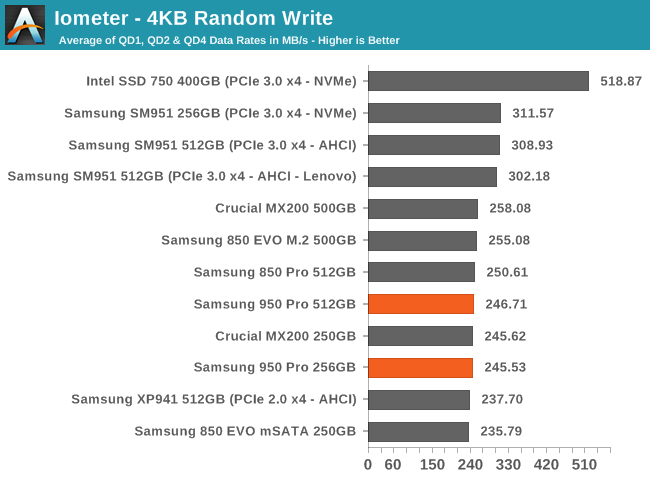
The 950 Pro's random write speeds aren't benefiting at all from the PCIe interface or the NVMe protocol, and are about 20% slower than the SM951. Since it's happening to both drives it probably isn't a thermal issue, so this may be the result of a firmware change. Still, the Intel SSD 750 is the only retail drive that significantly outperforms the tightly clustered competition.
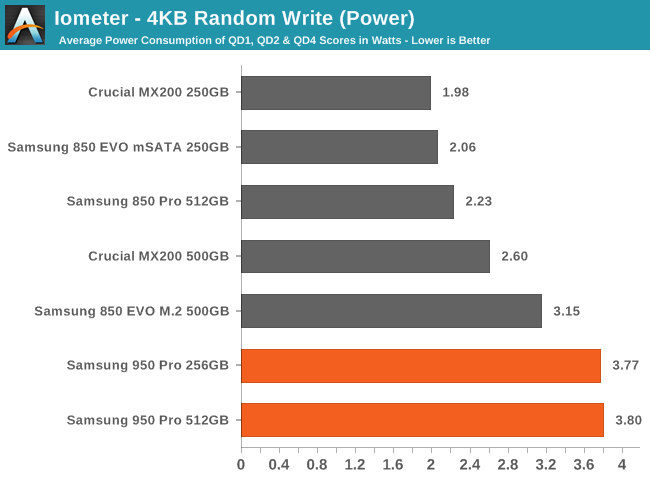
The higher power consumption during the random write test is a problem, since it's not buying any extra performance.
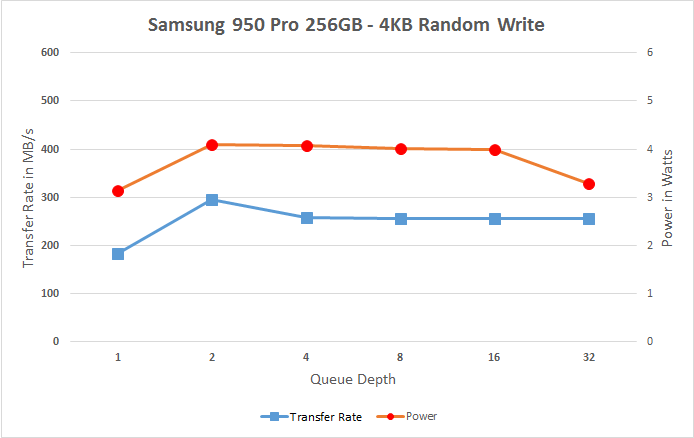 |
|||||||||
After increasing significantly from QD1 to QD2, performance and power drop slightly and stay flat for most of the rest of the test. At the very end, a slight drop in power for the 512GB and a more significant drop for the 256GB may indicate a change in what background processing is going on; the drive may be postponing some garbage collection during the onslaught of writes at the maximum queue depth, or it may be a coincidental case of the background processing catching up and throttling back near the end of the test.
Random Read Performance
Our random read performance test is conducted on a full drive and tests queue depths from 1 to 32. We focus primarily on the lower queue depths that are typical of interactive use, but also look at how the performance and power scales to more intensive loads. For desktop use, searching and virus scanning are typically the biggest sources of random reads, and they can exercise some of the larger queue depths.
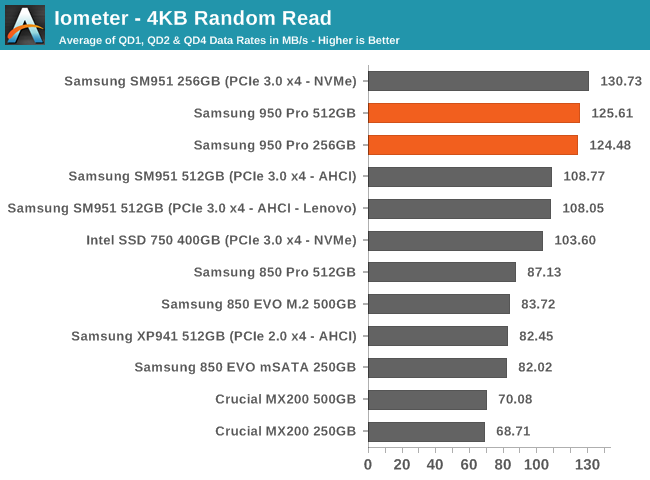
The strong random read performance of the 950 Pro provides great justification for its status as the a flagship drive for the consumer market.
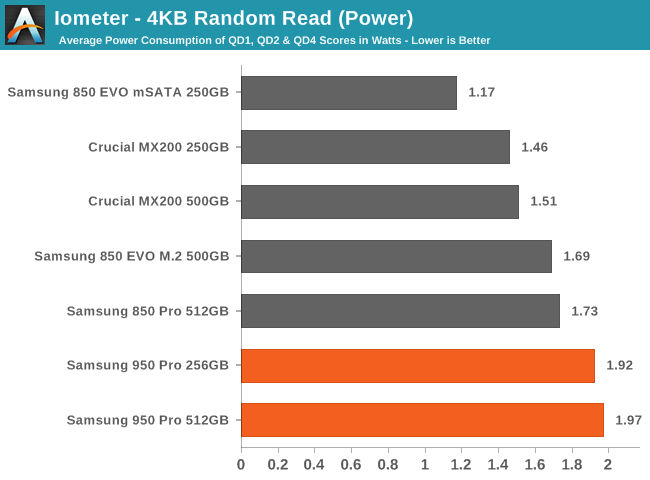
The 950 Pro's power consumption is moderately higher but nowhere close to being proprotional to the performance advantage; the 950 Pro doesn't have to run hot to offer great performance.
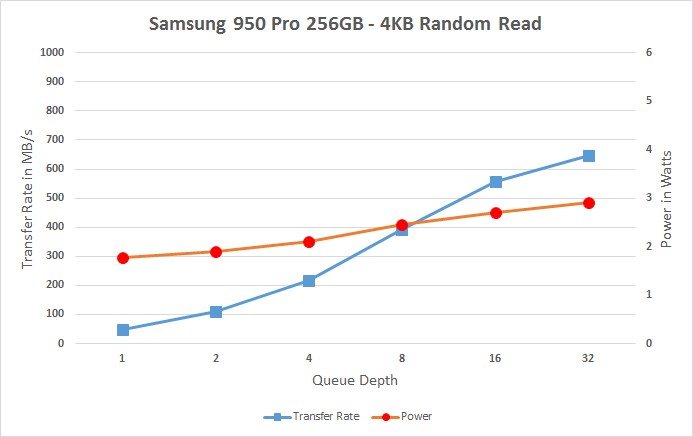 |
|||||||||
Power and performance scaling look very typical here, except I had to expand the performance axis for the 950 Pro. Both drives pass SATA's limits at or before QD16.










142 Comments
View All Comments
MHz Tweaker - Monday, November 16, 2015 - link
I have an IT service company and have been doing IT for a few decades. I am with you on how incredibly annoying it is to work on some of the hodge podge of hardware that comes in for service. Specifically there are those that refuse to upgrade early P4's or Sempron single core systems with 512 or 256 megs of RAM. Certainly these should have failed by now. They barely run XP let alone modern security needed to protect them. Internally all our workstations are Z97, X99, x79, Z170's with 4690K's, 4790K's, 5930K, 3930K and 6700K CPUs. Every machine has a Samsung or Intel SSD for a boot drive and a Hitachi 4, 5 or 6TB drive for work and storage. All systems also have 16 or 32GB RAM. I am just amazed at how much time the average person wastes waiting on an entry level PC to do things. I mean many of us spend in excess of 40 hours a week at a keyboard. I get much more done when I keep my equipment in tip top shape and fresh. Nothing has a chance to break down. Many companies throw tons of money at "image" but internally the infrastructure is held together with bubble gum and band aids.Oh BTW, I got our first 950 Pro 512MB Yesterday :-)
Deders - Thursday, October 22, 2015 - link
Until Samsung announce again that SSD's are not meant to use sleep, their excuse for computers with 830/840's freezing for 30 seconds after waking up.BurntMyBacon - Friday, October 23, 2015 - link
@Deders: "Until Samsung announce again that SSD's are not meant to use sleep, their excuse for computers with 830/840's freezing for 30 seconds after waking up."Is this a known issue or are you just speculating about what might (probably?) occur in the future?
I am using quite a few 830s and have deployed quite a few more all (up to this point) without this issue. In my experience, they've been some of the most reliable drives I've used. I know of a few 840s without issues as well, but I've tried to avoid them as much as practical as I'm still not convinced the industry fully understands the long term consequences of simultaneously increasing leakage and cutting down the margin of error to get that third (fourth, fifth, etc.) bit in. I suspect it'll be fine on some (larger) process nodes, but the 840EVO issues suggests that there is a lower limit to how small you can get while trying to get that extra bit (and storing long term). In any case, it would be nice to know if there is something I should be looking out for here and whether practical mitigations exist.
bill.rookard - Sunday, October 25, 2015 - link
Agreed. I have several systems with the 830s in them and have zero problems with them. I avoided the 840s because those went with the TLC and I was iffy about them, and the 830s are rock solid and very fast.Chaser - Tuesday, October 27, 2015 - link
Boot times matter to me too. Makaveli must have a remote control while he's making his bagels.carl0ski - Monday, May 16, 2016 - link
I'd say the most annoying part is the Windows boot logo is a fixed time to complete.So even if Windows 7 8 10 boot up faster it still waits for the pretty video.
Turn it off from msconfig and windows 7 on 850 will boot in 3 seconds instead of 10 seconds
beginner99 - Thursday, October 22, 2015 - link
Most people that buy such a product usually are enthusiast and play around like over clocking. 10 sec more per boot is then pretty annoying.Makaveli - Thursday, October 22, 2015 - link
I'm from the era of overclocking with jumpers on a motherboard and far longer post times. If waiting 10 seconds for a machine to boot is too long while trying to get a stable overclock then do it in windows. Or does everyone in this generation have ADD?AnnonymousCoward - Thursday, October 22, 2015 - link
Oh, so time is only valuable to those with ADD? You're a fool.Makaveli - Thursday, October 22, 2015 - link
Go troll else where tool!